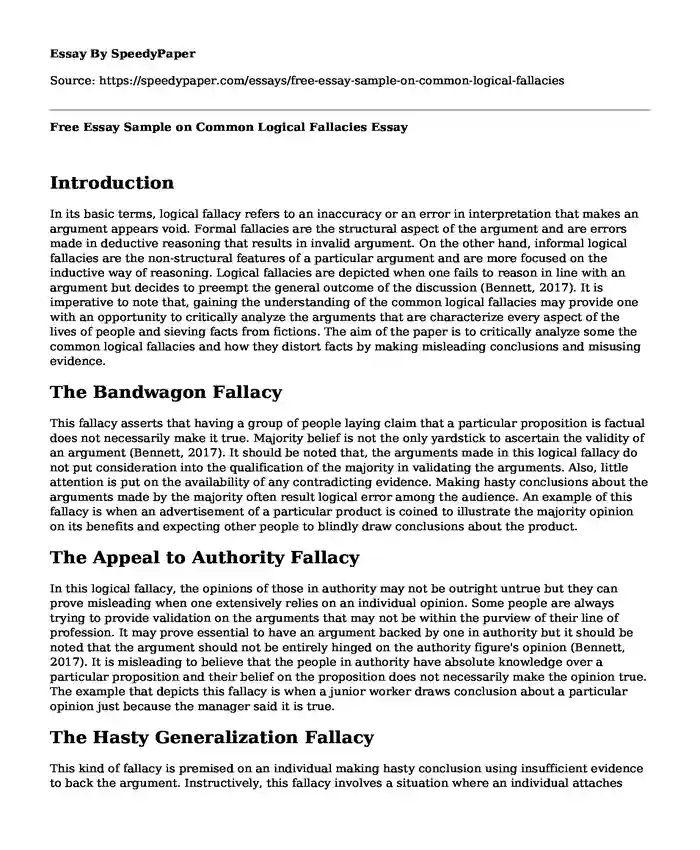
| Type of paper: | Essay |
| Categories: | Marketing Consumerism Analysis |
| Pages: | 3 |
| Wordcount: | 647 words |
Introduction
In its basic terms, logical fallacy refers to an inaccuracy or an error in interpretation that makes an argument appears void. Formal fallacies are the structural aspect of the argument and are errors made in deductive reasoning that results in invalid argument. On the other hand, informal logical fallacies are the non-structural features of a particular argument and are more focused on the inductive way of reasoning. Logical fallacies are depicted when one fails to reason in line with an argument but decides to preempt the general outcome of the discussion (Bennett, 2017). It is imperative to note that, gaining the understanding of the common logical fallacies may provide one with an opportunity to critically analyze the arguments that are characterize every aspect of the lives of people and sieving facts from fictions. The aim of the paper is to critically analyze some the common logical fallacies and how they distort facts by making misleading conclusions and misusing evidence.
The Bandwagon Fallacy
This fallacy asserts that having a group of people laying claim that a particular proposition is factual does not necessarily make it true. Majority belief is not the only yardstick to ascertain the validity of an argument (Bennett, 2017). It should be noted that, the arguments made in this logical fallacy do not put consideration into the qualification of the majority in validating the arguments. Also, little attention is put on the availability of any contradicting evidence. Making hasty conclusions about the arguments made by the majority often result logical error among the audience. An example of this fallacy is when an advertisement of a particular product is coined to illustrate the majority opinion on its benefits and expecting other people to blindly draw conclusions about the product.
The Appeal to Authority Fallacy
In this logical fallacy, the opinions of those in authority may not be outright untrue but they can prove misleading when one extensively relies on an individual opinion. Some people are always trying to provide validation on the arguments that may not be within the purview of their line of profession. It may prove essential to have an argument backed by one in authority but it should be noted that the argument should not be entirely hinged on the authority figure's opinion (Bennett, 2017). It is misleading to believe that the people in authority have absolute knowledge over a particular proposition and their belief on the proposition does not necessarily make the opinion true. The example that depicts this fallacy is when a junior worker draws conclusion about a particular opinion just because the manager said it is true.
The Hasty Generalization Fallacy
This kind of fallacy is premised on an individual making hasty conclusion using insufficient evidence to back the argument. Instructively, this fallacy involves a situation where an individual attaches validity on a particular argument by drawing conclusion using a small proportion of evidence that may not give the argument the required validity (Bennett, 2017). Also, the individual does not consider the holistic aspect of the opinion and the related evidence that has the potential to prove its validity or not.
Conclusion
In conclusion, logical fallacies often weaken the argument and make people to believe non-factual opinion about certain propositions. It should be understood that fallacies are often used in the political and economic spheres where facts are distorted to give a particular narrative, which may not be true, credence with the intention of duping the audience to believe in such narratives. They are usually assertions that are conveyed to the intended audience and attempt to make them appear credible and valid as possible. Moreover, marketing companies often employ the use of logical fallacies to distort facts and making their customers stay loyal or embrace new products without establishing whether the arguments in the advertisement are valid.
Reference
Bennett, B. (2017). Logically fallacious: the ultimate collection of over 300 logical Fallacies (academic edition). eBookIt. com.
Cite this page
Free Essay Sample on Common Logical Fallacies. (2023, Jan 08). Retrieved from https://speedypaper.net/essays/free-essay-sample-on-common-logical-fallacies
Request Removal
If you are the original author of this essay and no longer wish to have it published on the SpeedyPaper website, please click below to request its removal:
- Free Essay on Gentrification: Urban Displacement and Unaffordable Cost of Living
- Fast Food Essay Examples
- Essay Example on Research in Management Studies
- Essay Sample on Human Rights Watch's Policy of Ensuring the ICC's Impartiality
- Paper Example on Comparison of Two Cases of Fraud in Companies
- Paper Example: Anna and the Magic Medallion
- Essay Example on Planning for Holiday Shipping at FedEx
Popular categories




